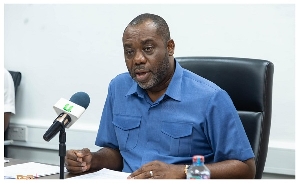- Home - Entertainment
- Lifestyle News
- Entertainment Videos | TV
- Year In Review
- Music News
- Entertainers
- Entertainment Archive
- Entertainment Photos
- Jokes
- Entertainment Headlines
- Ameyaw Debrah
- Brown GH
- Celebrities Buzz
- GH Base
- Ghana Celebrities
- Gh Gossip
- GH Page
- GH Splash
- Hot Gossip GH
- YEN

General News of Saturday, 15 February 2003
Source: gna
Kufuor urges GIS to help facilitate economic growth
The President Mr John Agyekum Kufuor on Friday called on the Ghana Immigration Service (GIS) to play a more proactive role in the nation's development by helping to evolve strategies to achieve an optimal balance between professionals leaving the country and those brought in.
He observed that the strategies of the developed world are "worthy of emulation here", and that the GIS, has no doubt, a critical role to play in the socio-economic development of the country.
President Kufuor, made the call in an address read for him by the Minister of Environment and Science, Professor Dominic Fobih, at the passing out of the second batch of cadets from the GIS academy, at Assin Fosu.
He told the GIS, to in this regard, speedily process applications for residence and establishment for foreign nationals wishing to settle and contribute genuinely to the nation's economic growth.
President Kufour, however reminded the men and women of the service that this was only one part of the of the role they have to play and that they also have to take firm action against those, " who are prepared to break our laws and cause financial and economic losses".
" Whilst we desire to attract foreign partners into our country, we should be wary of the security implications for the state", he admonished, and noted that the country which carries an image of stability in the sub-region, continues to play host to about 40,000 Liberian refugees, and that the current volatile situation in Cote d'Ivoire, threatened it with a potential influx of another set of refugees and Ghanaian returnees.
He tasked them to endeavour to let the issues of cross border crime: of women and child trafficking, small arms smuggling and drug trafficking engage their attention, stressing that the nation is already faced with the sceptre of the involvement of foreigners in crime and other vices in the country.
President Kufuor, in this regard, stressed that the enforcement and monitoring capacity of the GIS will be required more than ever to ensure that foreigners abide by the country's laws.
He however, cautioned them that the sensitive nature of their functions and the fact that they are the first line of officers and the point of contact, made it absolutely important for them to be professional in the conduct of their duties and to maintain the highest ethical and moral standards.
" I am sure you are aware that we live in a competitive and changing world where nobody can afford to be complacent. Your actions or inactions could cause business to move from Ghana to other countries with more competitive advantages", he warned.
According to him, its service today, was no longer just to enforce law but is a critical economic and political tool, whose broad functions include the facilitation of the flow of investment capital, skills and technology and the deterrence of unlawful entry by criminals.
The President, therefore, urged the GIS to strive to improve continuously, consolidate and strengthen the quality of service it provides and said this challenge, called for a more professionally managed Immigration Service.
He urged the Service to strive continuously to improve the quality of service it provides in order to achieve the right balance between the facilitation/ enforcement nexus.
The President, was therefore happy that under its new leadership, the service was undergoing a massive transformation exercise with the support of technical experts from Pricewaterhouse Coopers and UK Immigration, to enhance its operations.
He touched on the development of a Management Information System (MIS) strategy, which involves the construction of a Data Centre and the computerisation of all immigration procedures and processes.
He observed that it was unfortunate that a strategic agency like the GIS should operate manually in this age of information technology and said the Centre, which is currently under construction would become fully operational by the end of July this year.
The President noted that the establishment of the Centre, is an indication of the importance government attaches to the role of information technology in development, and among others, observed that it would enable passenger screening and document handling at the major entry points to be electronically processed.
During their nine months training, the 66 cadets, made up of ten women and 56 men were among others, educated on immigration law and regulations, immigration procedures and operations, document fraud and tactical intelligence and investigation and international affairs.
Cadet officer Francis Tachie was adjudged the overall best cadet during the training.










